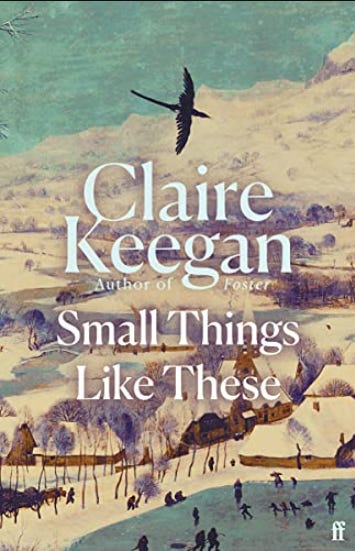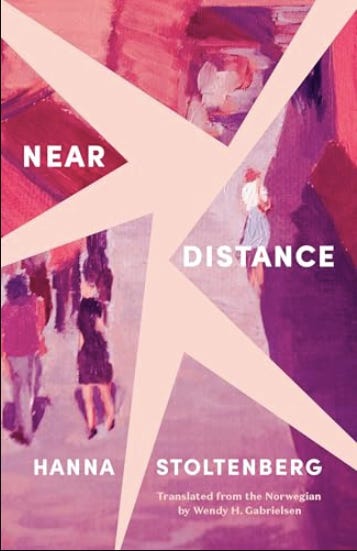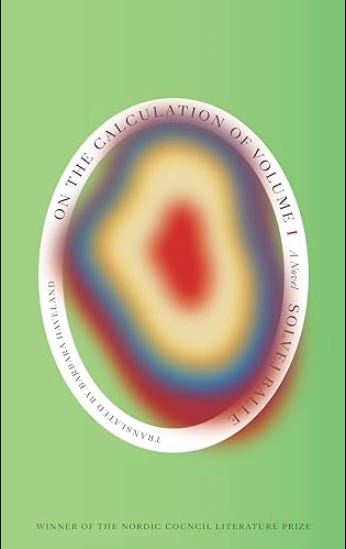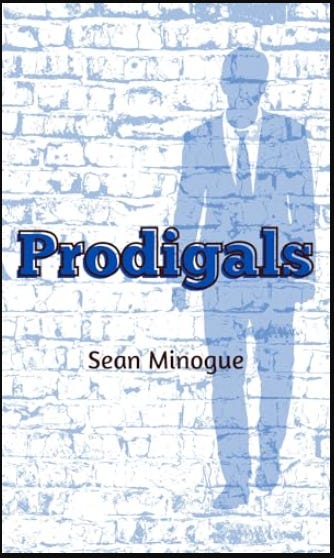Heatwave
You know that Japanese term that translates as ‘revenge bedtime procrastination’? Well, I had a severe case of it last week. You see, we had an unseasonably late heatwave here, with daytime temperatures well above 30°C, making it too hot to sit outside and read in the late afternoons. Too cold to go outside? Sure, I can understand that. I live in Canada, that’s just life. But too hot? It feels insulting, somehow. So I made it a point to sit outside after sunset and well into the night to read as much as I could, as revenge for what felt like wasted days. This time of year I tend to indulge in one big history book, and while I do have one I’ve been meaning to get to, I opted instead to clear as many short books off of my e-reader as I could manage.

Small Things Like These by Claire Keegan
Faber & Faber, 2021; 116 pages.
This was amazing. It’s about a father in Ireland in the 80s (70s?), and his decision to act on the harm the Catholic Church is causing when he accidentally stumbles onto a crime committed by the nuns who run the local Magdalene laundry. I really don’t have anything to say except it really is as brilliant as everyone says it is, and it absolutely deserves to be as canonical a Christmas story as anything since Dickens.
If Only by Vigdis Hjorth
Translated from the Norwegian by Charlotte Barslund.
Verso Fiction, 2024; 352 pages.
One of Hjorth’s earlier works, finally translated to English after her more recent work has begun to get noticed in North America. A Norwegian woman—she’s married, has kids, and writes radio plays—falls hard for a professor from Trondheim, sleeps with him and wants to get divorced so she can be with him. He’s not interested in doing the same. She becomes obsessed with him, and wears him down after three years. They get together but it turns out he’s a prick: he’s an alcoholic and constantly has five or six other affairs going on at the same time.
Wasn’t big on this one. Don’t get me wrong, I’m still a major Hjorthhead (thanks to
for coining the term), but I prefer her later work, and would recommend that those new to the Hjorth community start with something like Will and Testament (an autofictional novel about a woman coming to terms with being sexually assaulted by a family member while being dragged into an inheritance dispute), A House in Norway (a landlord’s fight with Polish tenants as an extended metaphor for geopolitics), or Long Live the Posthorn! (about discovering the importance of solidarity in a seemingly trivial campaign against the third EU postal directive).Near Distance by Hanne Stoltenberg.
Translated from the Norwegian by Wendy Harrison Gabrielsen.
Biblioasis, 2025; 154 pages.
I messed up with this one and I’m blaming it on the heat. I couldn't think of Hanne Østravik's name and read this when I was actually looking for Østravik's Stay With Me. But whatever, this wasn't terrible. An older Norwegian woman who works a dead end job managing a jewellery store and spends her nights meeting men from dating apps is invited by her adult daughter on a trip to London. The daughter quite clearly intends to sleep with an old university friend to get back at her cheating husband, and the mother spends time reflecting on her own failed relationships and her absence from her daughter’s early life. The prose is really topnotch and the author has a great eye for observations, though the observations don’t seem to have much connection to the story. Both women are looking for something and can’t seem to find it, and while that seems true to life, it leaves the novel feeling unresolved. Don’t think this’ll leave a lasting impression on me but I also didn’t feel as though I’d wasted my time.
On the Calculation of Volume I by Solvej Balle
Translated from the Danish by Barbara J. Haveland
New Directions, 2024; 160 pages.
You remember that episode of Star Trek where Dr. Crusher is stuck in a time loop? That’s what happens to Tara, the protagonist of this literary sci-fi novel, a French lady who runs a small business with her husband selling rare manuscripts. She’s stuck constantly reliving November 18th, an ordinary day in her life, except that each day she has to wake up and explain to her husband why she is home early. Tara tells him about her repeating days and he always believes her, but even so, having to walk her husband through his astonishment every single day takes a heavy emotional toll, and eventually our protagonist moves out, into a deserted flat (after all, it’s ‘only’ for one night).
Often when a literary novel has a sci-fi element, the author tends to forget that there’s a whole tradition behind the trope they’ve chosen, problems that have already been explored, etc. I don’t think that’s the case here. If anything, Balle is innovating the genre. Every sci-fi time travel story is about a hero who solves the problem, or at least quickly learns the principles of time travel within the story. But here, Tara is stuck and it creates this brilliant ennui/claustrophobia. There is no simple rule as in all the popular movies. Instead, there are discrepancies that she can observe but struggles to understand. Her hair continues to grow and a small burn on her hand heals, as if the days are still passing. The balance in her bank account resets every night, but the actual stock on the shelves of the stores soon deplete, so that she has to move farther and father out to get things like the brand of chocolate she likes. A Roman sestertius returns to its previous owner. On the other hand, items she keeps nearby stay with her.
What is going on here? I, for one, can’t wait to find out. On the Calculation of Volume I is the first in a projected seven volume series. The second book is already out, and I intend to get to it soon. The third volume is (I think) scheduled to be published in English this fall.
Prodigals by Sean Minogue
Latitude 46, 2025; 70 pages.
This was a lot of fun. It's sort of like a reunion novel, except it’s the script of a play and only one character is reuniting with the others, who've stayed put in Sault Ste. Marie, Ontario, their lives revolving around a dive bar. One of their number stays offstage for the duration of the play, but he's the reason they're called together: he's on trial for killing someone in a bar fight. But the reason we're here is for the banter, which is amazing. Minogue really captures that feeling of being stuck in a group of people who all know each other a little too well, who could use some distance from one another but are too inert to find it.
Prodigals isn’t without its missteps: it has those moments you sometimes get in plays where characters speak a little too bluntly, outright stating their problems in ways real people would be at pains to avoid, and for some reason each of the play's seven scenes ends with a soliloquy given by a character not-quite giving testimony about their offstage friend, but these bits are at worst a little awkward, and shouldn't dissuade you from seeking this one out.
I wrote recently about Kate Beaton's call for more working class literature, and I think this fits the bill nicely. Imagine if Always Sunny had stayed a little more realistic and downtrodden as its earliest seasons, not quite as cartoonish but still plenty funny, and you've got the spirit of Prodigals.
On Saturday we finally got a break from the heat, and anyway I remembered that mornings exist—you know that sort of bleary bit at the start of the day, where you drag yourself around until you wake up? Turns out they’re also often cooler than the heat of the day.
There’s a tree with blackberries on it maybe two arm lengths away from where I like to sit at, and as I was reading a little bird landed and started picking at the berries and I realized he was getting he was getting drunk off of them. I’d always heard about that, but I’d never seen it happen. I found out later he was a cedar waxwing, one of the only North American birds that specializes in eating fruit. He perched on the branch for maybe twenty minutes, completely oblivious to my presence. He didn’t move at all, but he was breathing pretty heavy—all I could think was yeah buddy, I’ve been there. I went inside to get more coffee, and he was still there when I came back. I was kind of worried for him, to be honest. After a while he started to come around, bobbing on the branch and doing a bit of preening. He finally noticed me as he was having another berry, and decided to retreat deeper into the tree, not quite as blitzed as he had been, but now popping berries every couple of minutes. Hair of the dog, I guess.
More books
Three sophisticated books for adults… and one with dinosaurs
Eurotrash by Christian Kracht and Perfection by Vincenzo Latronico
Three comic books: Night Fever by Ed Brubaker and Sean Philips, The Armed Garden and Other Stories by David B, and On the Camino by Jason
Permafrost by Eva Baltasar and The Private Lives of Trees by Alejandro Zamba
Oh, by the way: I’m now a submissions reader at The Ex-Puritan. Deadline for the next issue is coming up soon and submissions are capped, so if you’ve got something, submit.
Instagram | Goodreads | Letterboxd | Bluesky







Always enjoy your book reviews!